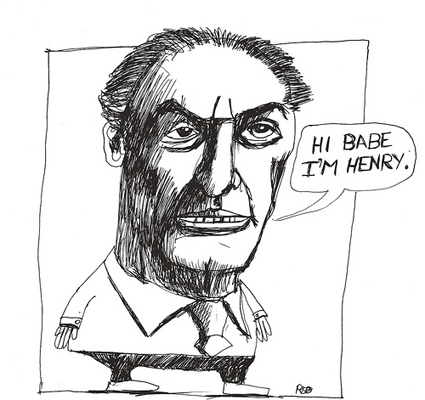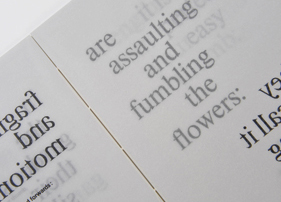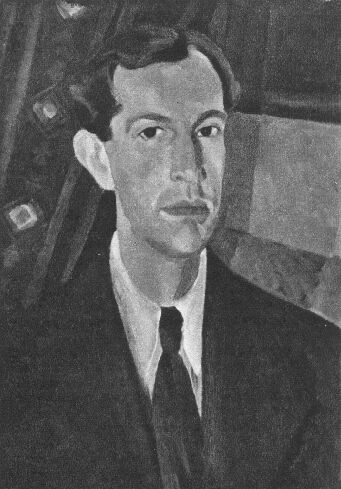I'm happy to be able to share this excellent caricature of Henry Reed drawn by the artist Rod MacGregor, a self-described "mover of pens":
Rod's other work can be found on The Pen Mover Flickr and Instagram pages, including these great renderings of Robert Frost and William Burroughs.
|
Henry Reed Caricature
P J Crook's The Naming of Parts"The Naming of Parts" (2003), acrylic on wood and found objects, by P J Crook, in the collections of the Imperial War Museum: This piece refers to Henry Reed's poem of the same name, drawing on his experiences in the Second World War. It was made during the recent war with Iraq in 2003, in reaction to another of the artist's pieces in the Museum's Art collection, 'Other Mothers' Sons.'
Naming of Parts PosterTeam Impression, a printing house based in Leeds, are celebrating their tenth anniversary with a year-long project called Ten, featuring ten 'articles and accompanying posters which are the result of collaborations between some of the world's most prestigious names in graphic design.'
The third collaboration for the Ten project is based on a setting of Henry Reed's "Naming of Parts" by the graphic artist and typographer Pamela Bowman, who co-founded the design studio dust in 2000. What began as a student project at Leeds Metropolitan University in 1995 was eventually published by Simon King Press in 1999 as Lessons of the War: An Artist's Book. In Bowman's design, the text of Reed's poem is presented on see-through stock, illustrating the dream-like, backward-and-forward qualities of the soldier's internalization of his lesson: The renowned graphic designer and author Ken Garland calls Bowman's book 'a most sensitive and suitable use of translucent paper to convey the idea of parallel spoken and internal text.' Garland and Bowman discuss the work on Team Impression's Ten webpages, where you will see the poster that resulted from their collaboration. Links to purchase a limited, numbered edition of the A2 poster at the bottom of the page!
Read, Reed, Stokes (and Reid)Adrian Stokes was an eminent British art critic, and a painter and poet in his own right. Born in 1902, educated at Oxford, Stokes met Ezra Pound during a trip to Italy, and it was Pound who persuaded T.S. Eliot at Faber & Faber to publish Stokes' first collections of essays: The Quattro Cento: A Different Conception of the Italian Renaissance (1932), and The Stones of Rimini (1934). Later works include Smooth and Rough (1951), and Michelangelo: A Study in the Nature of Art (1956).
In his 2002 introduction to Stokes' Michelangelo, the late Richard Wollheim begins: In his lifetime Adrian Stokes achieved the kind of fame that has nothing to do with success. No book of his sold more than five hundred copies, but his prose, fiercely difficult by the standards of the time, seized the imagination of some of the most interesting and creative minds of his age. They included sculptors, painters, poets, architects, critics of the arts: Henry Moore, Barbara Hepworth, Ben Nicholson, Henry Reed, Colin St John Wilson, William Coldstream, Elizabeth Bishop, Lawrence Gowing, Andrew Forge; the list could go on. That's one heck of a fan club. I was curious about how Wollheim compiled this list, and a quick search turns up an official Adrian Stokes website (caution! pop-up ads). There we find Dr. Stephen Kite, a Stokes scholar, quoting a letter written to the Times Literary Supplement in 1965, "signed by eighteen prominent thinkers and artists — including Coldstream, Moore, Hepworth and Wollheim — claimed Adrian Stokes as amongst 'the most original and creative.... writers on art.'" A-ha! That's three of the critics on Wollheim's list, as well as Wollheim himself. Thankfully, Kite provides footnotes for his references. Going to the TLS for August 12, 1965, we find the letter Kite refers to: a response to a list of important books of the first half of the decade, in the July 29 issue. Here is the letter, reproduced in its entirety: Sir,—The list of "English Books of the 1960s" in your special number, "Sounding the Sixties", includes, under various headings, more than twenty volumes concerned with aspects of art. During the 1960s Mr. Adrian Stokes has published his Three Essays on the Paintings of our Time, Painting and the Inner World, and The Invitation in Art. None of them gets a mention in your list. Although, as you say, 'the list does not pretend to completeness', it seems to us unfortunate that it should exclude a writer who has claims to being the most original and creative living English writer on art. ALAN BOWNESS, WILLIAM COLDSTREAM, ANDREW FORGE, JOHN GOLDING, LAWRENCE GOWING, STUART HAMPSHIRE, BARBARA HEPWORTH, FRANK KERMODE, R. B. KITAJ, ROBERT MELVILLE, HENRY MOORE, JOHN PIPER, HERBERT READ, HENRY REED, NORMAN REID, JOHN RUSSELL, DAVID SYLVESTER, RICHARD WOLLHEIM. (p. 697) With the addition of Bishop, Nicholson, and Wilson, that fills out Wollheim's list. I wonder why he mentions Reed in his introduction, and not the better-known Herbert Read? There are other connections, too: both Stokes and Reed were influenced by the psychoanalytic theories of Melanie Klein (Stokes was a patient of Klein's), and at least three of the artists and writers who signed the letter to the editor knew Reed personally: art critic Robert Melville, from Birmingham (brother of the painter John Melville, see below); Frank Kermode, whom Reed knew in London and Seattle; and, of course, Elizabeth Bishop. Adrian Stokes died in 1972. A selection of his poetry can be found on the Adrian Stokes website, and many of his paintings can be viewed online through the Tate Gallery.
Have You Seen This Painting?I am looking for a painting. Specifically, I am looking for "Portrait of Henry Reed," painted by John Melville (1902-1986), the English surrealist associated with The Birmingham Group. A photograuvre reproduction of the painting appeared in the Penguin New Writing, vol. 27, in 1946. I'm keenly interested to know where this portrait currently resides:
Logically, the portrait was created prior to 1946. A potential clue to its genesis appears in Reed's 1954 radio play, The Private Life of Hilda Tablet. During the course of the play, the renowned composeress Hilda Tablet directs the narrator, "Herbert Reeve" (wink, wink), to interview a friend and artist, affectionately called "Bunny": Hilda: R. Egerton Bunningfield, ARA. He painted a damn good portrait of me in 1943. (fade chords behind Mr Bunningfield. He seems rather weighed down by unsuccess) Bunningfield: Well, yes, the picture has been much admired, and it was very good of Miss Tablet to sit for it. I asked her to, you know. It was meant to be one of a series of great women of the time, their part in the war effort. Naturally, I wasn't quite prepared for quite all the conditions Miss Tablet imposed. I wanted her to be playing an instrument, of course, but what I had in mind was a clavichord or the like, with highlights on a brocade dress and so on. I never imagined she would insist on the instrument being a bugle, though I agree it was appropriate to a picture illustrating the war effort and that. And she also insisted on it being an open-air composition; that's the whole of the Pennine Chain in the background... And quite frankly, Mr Reeve, she's the kind of figure I really would have preferred to have painted draped... but no, she insisted... (fade last words behind chords) Hilda Tablet and Others: Four Plays for Radio (1971), p. 70 Is the character Bunningfield an homage to Reed's Birmingham chum? Did Melville ask Reed to sit for him in 1943, as part of series of wartime portraits of Birmingham notables? It's difficult to know for sure which details of the radio plays are lifted entirely from Reed's life. The mention of the Pennines is intriguing as well, since it places the fictional painter in northern England (not terribly far north of Birmingham). All this is speculation, of course, and I could be wrong as wrong. I got to thinking about Reed's misplaced portrait this evening, after learning that the BBC announced today a commitment to digitize all 200,000 of Britain's oil paintings in public ownership, and have them available online by 2012. More information on the effort, and the BBC's "deeper commitment to arts and music," at the Guardian.
|
|||||||||||||||||||||||||||
|
|
||||||||||||||||||||||||||||











